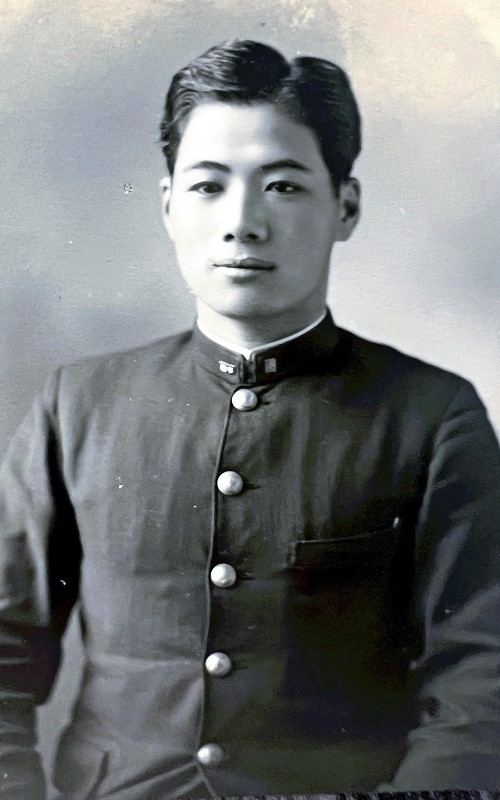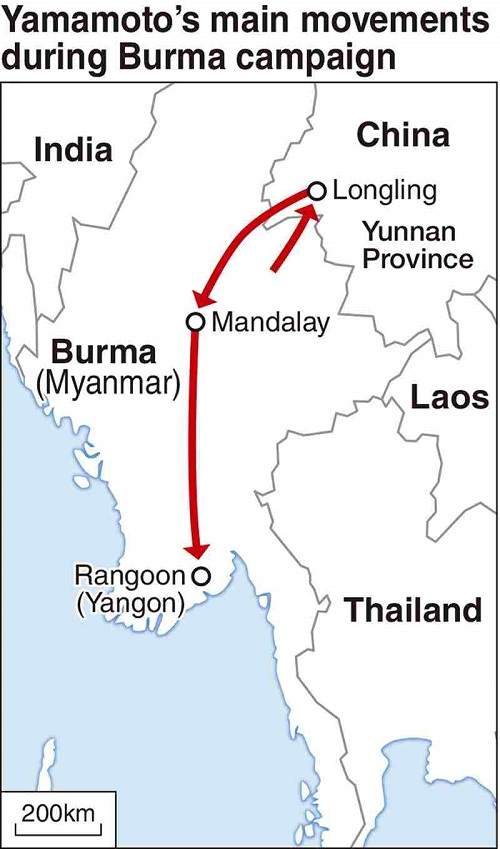WWII survivor describes ‘hell’ of Burma campaign

Eisaku Yamamoto recounts the harsh situation on the World War II battlefields, with memoirs of the Burma campaign in front of him, at his home in Kusatsu, Shiga Prefecture, on July 30.
1:00 JST, August 18, 2022
At age 101, Eisaku Yamamoto continues to share his story about the devastation of war from Kusatsu, Shiga Prefecture, where he lives. He was on the battlefields during World War II fighting for Japan in its campaign in Burma, the Southeast Asian country now officially called Myanmar. He was among the many student-age Japanese who were deployed to the front lines during wartime.
Yamamoto graduated early from the Tokyo University of Agriculture and was drafted into the Imperial Japanese Army in September 1942 when he was 21. He was sent to war in March 1944 as a private first class in the 119th infantry division. He and his fellow soldiers were on a mission to support a Japanese garrison that was deployed in China’s southern Yunnan Province to cut off U.S. and British supplies to China.

Eisaku Yamamoto as a student at the Tokyo University of Agriculture
In June 1944, the sounds of weapons of war with their blasts and booming roars cut through the jungle near the border between China and Burma. Yamamoto was washing pots in a stream about 50 meters from where his fellow soldiers were encamped. The sounds came from four enemy planes bombing and strafing the Japanese position. Yamamoto quickly took cover.
About 40 minutes later, he returned to the encampment.
“It was hell,” Yamamoto said.
Blood was everywhere. He saw a fellow soldier who had half of his face blown off and had died instantly, and another whose limbs had been torn off and was screaming from the pain. A private who had served longer than Yamamoto and had been kind to him had shrapnel in his neck as he groaned, “Please kill me,” before he died.
Somehow staying alive
Yamamoto’s division, which lost 16 personnel in that single attack, eventually arrived in Longling in the province and set up a position on a nearby mountain. China and the other Allied powers bombarded the position with more than 200 artillery pieces. The artillery fire seemed like rain, and Yamamoto’s fellow soldiers fell one after another.
With weapons and food supplies disrupted, his division was set to be wiped out when the order came to withdraw. A fellow private with malaria begged Yamamoto to take him along, but Yamamoto had no choice but to say sorry and leave him behind.
Running during the retreat, Yamamoto slipped and lost consciousness. When he regained consciousness, he found himself about 40 meters down a cliff. Ferns on the ground served as a cushion, so he survived. He then wandered around the jungle for two days shuffling along on wounded legs. He ran out of hardtack and water but managed to find his way to the main Japanese force in the area. He sobbed when he found out that about a dozen of the members in his division had all perished.
Serious injury

After leaving Longling, he moved from battlefield to battlefield in Burma. Near Mandalay, each soldier dug a hole from which to fight back with only rifles and grenades against enemy tanks. The dying scream of a fellow soldier in a shallow hole as he was crushed by a tank still rings in Yamamoto’s ears.
In August 1945, Yamamoto was strafed by enemy aircraft near Rangoon, now Yangon. He was seriously injured as the bones of his little toe and fourth toe were exposed. Three days later, he was at a field hospital when the war ended. He cried in frustration thinking of the many commanders and comrades who died in the war.
In June 1946, Yamamoto returned to civilian life at the age of 25. He entered the Shiga prefectural government with the desire to contribute to Japan’s reconstruction and was in charge of farmland reclamation. He was married and had a son and a daughter.
The devastation of the battlefield never left his mind, however. He can’t eat broiled eel as it smells like the grilled snake he had eaten on the battlefield. Every time he tried to eat eel, he threw up.
For years, he had avoided talking about the war. He had even felt guilty that he had survived the Burma campaign, which took the lives of 137,000 Japanese soldiers and civilian personnel.
Writing a novel
After turning 80, however, Yamamoto began talking about his war experiences at elementary schools and other settings out of a sense of urgency the war was being forgotten. He has given about 30 lectures on the war so far.
Last year amid the COVID-19 pandemic, he began writing a novel based on his wartime experiences. He spends five hours every day on his computer and has almost finished the novel.
It has been 77 years since World War II ended. Through the novel, Yamamoto hopes to pass on to future generations “the importance of life.”
This February when Russia invaded Ukraine, Yamamoto felt an emptiness about the situation, as many soldiers and civilians are being killed.
“Peaceful daily life is not to be taken for granted,” Yamamoto said. “I hope future generations continue to feel the preciousness of peace.”




